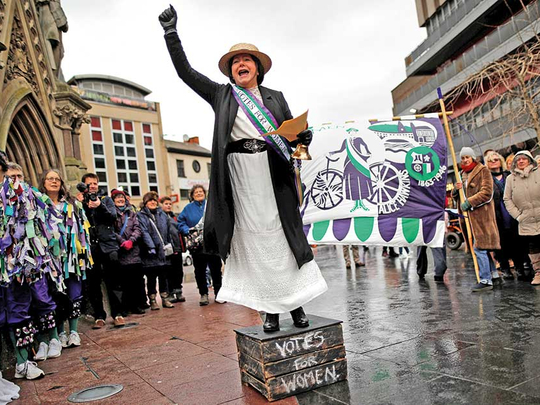
London: Prime Minister Theresa May led tributes to the “heroism” of campaigners on the centenary on Tuesday of women winning the right to vote in Britain, as a host of events honouring the Suffragette movement were held.
May said on Tuesday she wants to work with a team, which may make her different from the men who preceded her, as she marked the centenary of women winning the vote in Britain.
May, Britain’s second female prime minister, will also use the anniversary to press for an end to online abuse that is “coarsening” political debate.
In a speech in the northern English city of Manchester, the birthplace and home of the British suffragette leader Emmeline Pankhurst, May will announce government measures intended to make sure social media firms are stamping out offensive content.
But before the speech, May turned to how she finds her role as prime minister and the growing criticism from both inside and outside her Conservatives that she is not up to the job.
“My approach is much I would say about trying to work with the team ... I think it’s about ensuring you have different opinions being heard around the table but bringing those opinions together in a way that achieves an outcome that is good,” she told BBC radio.
Asked what she would say to her critics, some of whom have called for her to step down, she said: “I put a much greater focus on not what you say but on what you do, and I guess that is another difference perhaps between women sometimes and men.” May enjoyed a honeymoon in the opinion polls when she took power after Britain voted to leave the European Union in 2016.
But since losing her Conservatives’ majority in parliament in an ill-judged election in June, her leadership has been questioned.
Critics say her cautious approach has increasingly left her hostage to the deep divisions among her ministers, especially over Brexit, with some concerned the EU has now gained the upper hand in talks. On Monday, the EU said it was time for Britain to make a choice on their future ties.
But May will also use the centenary of the women’s vote to return to a favoured refrain and renew her call for a fight against online abuse, which she says often targets women lawmakers more than men.
Her measures will sit alongside a commitment from the minister for women and equalities, Amber Rudd, to offer £2.5 million (Dh12.7 million or $3.5 million) for schemes to increase women’s participation in political and public life.
“As we remember the heroic campaigners of the past, who fought to include the voices of all citizens in our public debate, we should consider what values and principles guide our conduct of that debate today,” she will say in Manchester.
Campaigners meanwhile hope to make fresh calls for Suffragettes who were jailed while fighting to win the vote for women to be pardoned posthumously.
The Fawcett Society, a British charity campaigning for gender equality and women’s rights, are among those urging the country’s interior minister Amber Rudd to officially pardon more than 1,000 women jailed during their struggle for equality.
Relatives of the Suffragettes, as well as leading lawmakers including Ruth Davidson, the Scottish Conservative leader, have backed the calls.
“Voting was a value judgment, not an intrinsic right,” she wrote in Tuesday’s the Daily Telegraph.
“That inequality is one of the reasons why I support calls to offer a posthumous pardon to those Suffragettes charged with righting that wrong.”
Rudd told the BBC she was aware of the campaign and “completely understand where it’s coming from.”
Britain’s Suffragettes adopted militant tactics in their fight for the vote, including the use of violence.
They chained themselves to railings, broke shop windows and blew up post boxes as part of their fight. They cut electricity lines, disrupted meetings and even bombed the house of a government minister.
“It is complicated,” Rudd said. “If you’re going to give a legal pardon for things like arson and violence it’s not straightforward.”
Organisers of an evening reception to launch a year-long “Vote 100” series of Suffragette events and exhibitions in Westminster have invited every living current and former female lawmaker.
It will be the largest-ever gathering of Britain’s women politicians, organisers believe.
“I look forward to joining hundreds of female Parliamentarians, past and present, to celebrate this very special anniversary,” May said ahead of the event.
“Everyone attending tonight will be there because of the heroic, tireless struggle of those who came before us.”
In parliament’s spectacular central lobby four historic acts of law will go on display together for the first time.
They include the Representation of the People Act, the Parliament (Qualification of Women) Act 1918, which allowed women to become MPs, the Equal Franchise Act 1928, which gave women the vote on the same terms as men, and the Life Peerages Act 1958, which allowed women to sit in the Lords as life peers.
Meanwhile a specially-commissioned public exhibition to mark the centenary, featuring life-sized images of central figures of the suffrage movement, was unveiled in London’s Trafalgar Square.
This year marks 100 years since parliament passed the law which allowed the first women, and all men, to vote for the first time.
On February 6, 1918, the Representation of the People Bill became law and added to the voting roll around eight million women who were aged over 30 and met other conditions.
Although it was not until 1928 that British women gained the same voting rights as men, the 1918 act was a major step that put the country far ahead of nations such as France.
A century later the ideals of equality are resonating again in the global wave of sexual harassment allegations seen in recent months, a leading academic has told AFP.
“In both cases, it’s a discussion of equality,” Myriam Boussahba-Bravard, a professor of women’s history and gender studies at Paris Diderot University, said ahead of Tuesday’s anniversary.
“The right to vote gave formal equality... But the question now is real equality,” Boussahba-Bravard said, adding: “The Suffragettes... knew this.”











